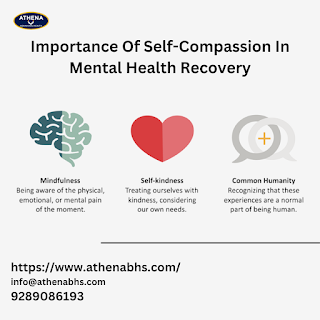Self-compassion is the practice of treating oneself with kindness, understanding, and acceptance, especially during challenging times or after experiencing a setback. It involves acknowledging one's struggles and offering oneself the same care and concern that one would give to a close friend or loved one. Self-compassion has become increasingly recognized as a vital component of mental health recovery.
Mental health recovery is a journey that involves healing from mental illness, overcoming the associated challenges, and moving toward a state of well-being. Recovery is a process that can be achieved through various means, such as therapy, medication, and support from loved ones.
Importance Of Self-Compassion In Mental Health Recovery
Self-compassion plays a crucial role in mental health recovery. Some of these are as mentioned below:
Overcoming Negative Self-Talk: Self-compassion can help individuals to overcome negative self-talk and reduce self-criticism. Negative self-talk is a common aspect of mental health issues, such as depression and anxiety, and can further exacerbate these conditions. Individuals who are self-critical may engage in negative self-talk, such as calling themselves names, blaming themselves for things that are out of their control, or engaging in rumination.
Self-compassion can help individuals to reframe their self-talk, offering themselves support and understanding instead of criticism. This can help to reduce the severity of mental illness and support the recovery process.
Managing Stress & Anxiety: Mental illnesses are often associated with high levels of stress and anxiety, which can make it difficult to manage daily life. However, self-compassion can help individuals to manage stress by reducing feelings of self-judgment and enhancing feelings of self-worth. Research has shown that individuals who practice self-compassion have lower levels of stress and anxiety than those who do not.
Cultivating Resilience: Mental health recovery is not always a smooth journey, and setbacks are common. However, individuals who practice self-compassion are able to bounce back from setbacks in a better way and move forward toward recovery. It helps them to acknowledge their struggles and offer themselves support, allowing them to learn from their experiences and grow stronger.
Improving Relationships: Mental illness can often strain relationships with loved ones and make it challenging to connect with others. Practicing self-compassion can help individuals to cultivate a more positive relationship with themselves, which can extend to their relationships with others. This is because individuals who practice self-compassion are more likely to be kind and understanding towards themselves and others, leading to more positive interactions and deeper connections.
Enhanced Overall Well-being: Mental illness can have a significant impact on an individual’s quality of life and satisfaction with life. However, self-compassion can help individuals to enhance their overall well-being and life satisfaction by reducing negative self-talk, managing stress, cultivating resilience, and improving relationships.
Road To Recovery
Self-compassion is a vital component of mental health recovery. It is a practice that can be cultivated through various means, such as therapy, meditation, and self-reflection. With the support of loved ones and mental health professionals, individuals can learn to practice self-compassion and support their mental health recovery journey. In case, there’s someone you know who is going through this phase of life and planning to seek professional help, Athena Behavioral Health is the place to be.
Athena Behavioral Health has a state-of-the-art infrastructure and well-furnished office that helps it in ensuring a comfortable stay for the patients. Sounds interesting? If anyone around you or someone else you know is dealing with any mental health issue and is searching for a mental health rehabilitation center, share the contact details of Athena Behavioral Health with them. They may contact us by sending us a WhatsApp message at 9289086193 or dropping us an email at info@athenabhs.com and our experts will contact them shortly.
Read More: Best De-Addiction Centres in Delhi, Best Psychiatric center in Delhi Gurgaon, Detox Centers in India





No comments:
Post a Comment
If you have any doughts. Please let me know